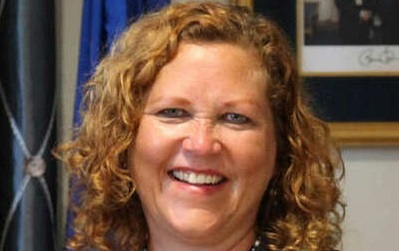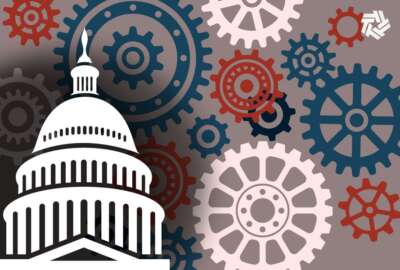An accomplished federal CFO has a forum to share lessons learned
Gwendolyn Sykes has operated as a CFO at large federal agencies and in two major universities. At the moment. She's the CFO of the Secret Service, and also a ne...
Best listening experience is on Chrome, Firefox or Safari. Subscribe to Federal Drive’s daily audio interviews on Apple Podcasts or PodcastOne.
No agency can operate effectively without a solid financial framework. And that’s where chief financial officers come in. My next guest has operated as a CFO at large federal agencies and in two major universities. At the moment. She’s the CFO of the Secret Service, and also a new fellow at the National Academy of Public Administration. Gwendolyn Sykes joined the Federal Drive with Tom Temin.
Interview transcript:
Tom Temin: And gosh, there’s so much to talk about. But one question that I’m curious about is you were CFO of NASA, basically, a department level sized organization, $16 billion in assets and spending every year. Now you’re at the Secret Service, which is a component of a large department. What’s the difference? And what was your choice in moving from the departmental level to the component level?
Gwendolyn Sykes: Well, I have to be honest, some were my choices, some weren’t my choices. At NASA I was actually a CFO, but I was what they call a political appointee. So I served under the Bush administration during that timeframe. Okay, so and that gave me my lovely journey into academia, where I moved on to Yale, and Morehouse. But the reason that I’m at Secret Service is that I decided to come back in and continue my public service. And I have well over 30 years of federal service in federal financial management, which is just an honor to be recognized by NAPA. But most importantly, I can honestly tell you that there’s really no difference between being at an agency level or a component level. Resources are resources, anytime that you’re trying to meet your operational mission, you need resources. Money, talks, and everything else walks, that’s kind of the motive. And I have just truly enjoyed two great opportunities, particularly NASA, you know, putting rockets in space, International Space Station, traveling to Mars, and then more importantly, being here at the Secret Service supporting the men and women of the service in their protective and their investigative operations and ensuring that our financial currency is protected throughout the United States.
Tom Temin: Sure. And when you were working for the George W. Bush administration, that was 12,15 years closer to the advent of the CFO Act itself. At that time that were CFO’s saying that agencies had not fully adopted all of the responsibilities and roles that they were supposed to have, as outlined in that act. And that was back then, coming back in now with the Secret Service, do you find that as the CFO, pretty much your responsibilities do align more so than they might have 15,16 years ago, with the intent of the framers of the CFO Act?
Gwendolyn Sykes: We’ve come a long way since the 1990 CFO Act, I can honestly tell you that most of the agencies, most of my counterpart CFOs that I work with, particularly at State Department, particularly at the Department of Homeland Security, Commerce Department, all the CFOs that I work with, and I have the opportunity to engage with, we have truly truly adopted that framework of the 1990 CFO Act. We are also working on and having collaborative conversations about what’s the next next to make sure that we are providing true transparency of the federal operations and the federal dollars as we move forward in our operations.
Tom Temin: And what are the frustrations? What are the opportunities? What’s it like in what is essentially a cash accounting system year by year that the federal government operates under? It’s like, biggest two-stroke engine in the world, you know, in an age of electric cars and four-stroke engines. But yet, that’s the way it is. There’s not really capital in the sense that you see it in industry, or the types of endowments you might have seen at Morehouse and at Yale. And so what does that do to the job of CFO do you think?
Gwendolyn Sykes: It makes it more dynamic, it makes it more challenging, and it makes it more imperative that we do a solid job. First of all, it makes it more challenging because everything is dynamic, who knew in 2019, walking into 2020, that we’d be experiencing a pandemic. And somehow we would have to transform on a dime, how we did our financial management operations, but more importantly, how we supported our organizations and missions in order to ensure that we were still being operational during the pandemic. Coming out of the pandemic, making sure that we’re truly transparent to the American taxpayers for those dollars and resources that they’ve entrusted to us to make sure that we’re doing a solid job and doing that. But more importantly, what I find the most humbling part of my job is the look on the faces of the men and women that I support and serve and making sure that they have the right tools at the right time to do what they need in order to make sure that they’re effective in their operations.
Tom Temin: We’re speaking with Gwendolyn Sykes, she’s the chief financial officer at the Secret Service, and now a new fellow with the National Academy of Public Administration. And before we get to that the people in Secret Service or even at NASA, for that matter that have programs, what do they seek from the CFO? What is it that you are called on to provide to them? They have resources that they know they have, and they’ve got to get something done. What do they ask of the CFO?
Gwendolyn Sykes: Oh, it can be anything at any point in time from unfortunately, when people jump over the fence, and we need to build a new fence at the White House, to being able to make sure that we have the properly trained and outfitted what we call our canine unit, in order to support our agents, from anything from the beast, which is, of course, the presidential limo. So I figure out ways to support those type of resource needs on a daily basis. It’s very, very dynamic, I can honestly tell you, there’s not a boring day here at the Secret Service.
Tom Temin: That’s right. So what you’re seeing is often unforeseen things that you could not possibly have budgeted for come up, maybe somebody smoked a cigar in the beast that wasn’t supposed to.
Gwendolyn Sykes: And I don’t think they smoke a cigar, and but go ahead.
Tom Temin:
If I was president, I would say “I’m President, I can smoke a cigar in here”, but maybe they don’t. But a fence falling over, being wrecked or some kind of, you know, act of destruction that you can’t really anticipate. So contingencies.Gwendolyn Sykes: It’s really more the world events and things that happen, hurricanes and if a hurricane occurs. Of course, the President wants to be there with the people and make sure that they know that he’s going to be there with the full support of the federal government to make sure that they can manage their way out of that current catastrophe. World leaders have to meet, the Queen, unfortunately, passing away unforeseen, but we have to be in a position and have the resources in order to respond.
Tom Temin: So you figure out a way to get all of that done within the legal statutory constraints and budgetary constraints that agencies live under.
Gwendolyn Sykes: And that’s why my office is very close to the general counsel’s office.
Tom Temin: Sounds like good geography there. And let me ask you this, as a black woman coming up through the federal ranks, there haven’t been many like you in the financial function. What’s that been like? And I know you’ve been noted for that very reason.
Gwendolyn Sykes: Well, earlier on, there weren’t a lot. But I can honestly tell you now there are many, many women due to the science, technology, engineering and math STEM that has been very promulgated in the early ’90s. And well into the 2000s has really brought up a very strong cadre and I found my own part, to make sure that I’ve mentored, guided women of all nationalities in order to have a great seat at the table. Because you can only imagine if you manage the resources, somehow, someway, you will definitely be at the table.
Tom Temin: What is your advice on the appeal of the financial world to young people of whatever stripe they might hail from?
Gwendolyn Sykes: And my appeal is the fact that you know, debits and credits aren’t what they used to be. And accounting isn’t what it used to be back in the day, you know, it’s not the pocket pen protector, you really do get the opportunity to do great and interesting things. And with automation, and everything that we’ve automated in the financial structure, we are now moving into an opportunity called data and data analytics, which supports those decisions at the table. So it’s a great opportunity, and it’s evolving into something that I don’t think the CFO act of 1990 even thought about.
Tom Temin: Interesting. And now you are a fellow at NAPA. Do you have a area of interest? I guess its finances, and financial controls. But what do you plan to work on there? Do you have any specific projects that have come up yet?
Gwendolyn Sykes: Well, no projects have come up yet. I actually do not get inducted until tomorrow. They have sent a few ideas in some of the areas of course, one of them is definitely financial management. But I am actually looking at overall federal government and accountability, responsibility, but more important, developing that cadre and corps of people that are really truly ready to serve the public.
Tom Temin: Sounds like you’ve liked federal finances and federal service.
Gwendolyn Sykes: Well over 30 years of serving.
Tom Temin: Gwendolyn Sykes is chief financial officer of the Secret Service and the new fellow in the National Academy of public administration.
Copyright © 2024 Federal News Network. All rights reserved. This website is not intended for users located within the European Economic Area.
Tom Temin is host of the Federal Drive and has been providing insight on federal technology and management issues for more than 30 years.
Follow @tteminWFED
Related Stories





